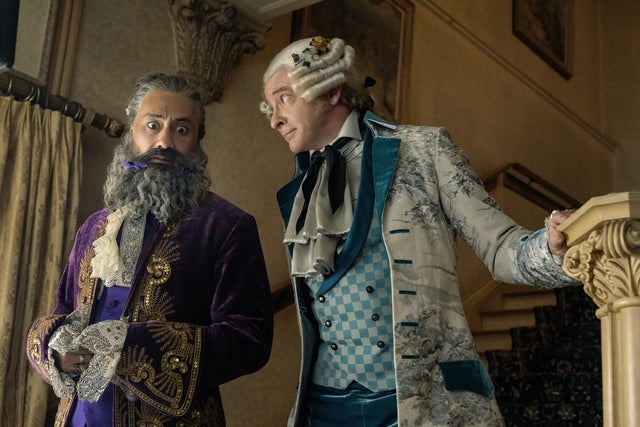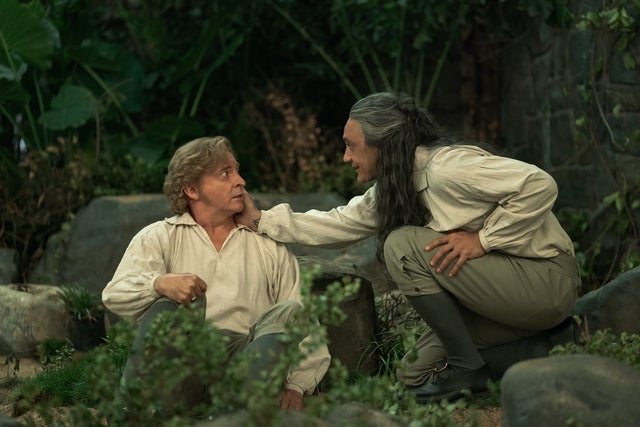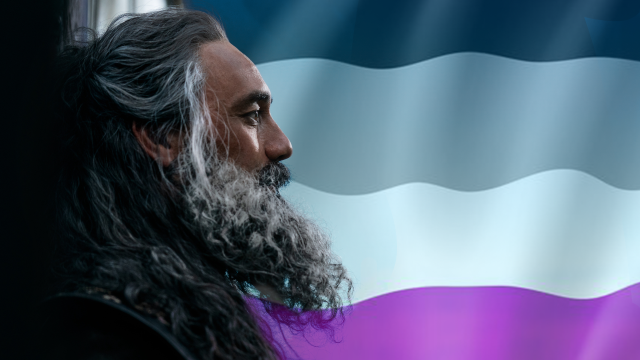In a show that has been lauded for shamelessly and bravely pushing its queer agenda, I believe there is space for ever more interpretations of identity among the characters of Our Flag Means Death. There is textual analysis to be done and by god, I’m the they/them to do it.
In Our Flag Means Death, the pirate Edward Teach, played by Taika Waititi, can be read as an asexual (or “ace”) character. The show does a lot of work to include a vast plurality of identities, most often by casually introducing characters and relationships rather than by producing flag pins or oversimplified explanations of identity during conversations. In lieu of explicitly introducing identity-based discussions, there is instead a nuanced and careful exploration of the act of queerness, the feeling of it, that is pervasive throughout the entire show. The vibes, dear reader, are queer as fuck.
“Ed’s entire public persona is performance, which has all the vibes of an ace person moving through the world masking allosexuality because it’s what the world expects, it’s how you get respect and are taken seriously,” Allison Epstein, a historical fiction novelist who identifies as both biromantic and asexual herself, wrote in an email to Gizmodo (full disclosure: I and Epstein know each other informally, and we share a literary agent). This is explicitly stated in Blackbeard’s conversations throughout the show. What if he’s just Ed, what if he gets to dress up in fancy clothes and go to a party? What if he gets to choose how he presents himself, how he’s seen, rather than how people see him? There’s one moment where he’s staring at a picture of himself in one of Stede Bonnet’s (Rhys Darby) books and asks, “Is this really what people think of me?”
If we interpret this as a reflection of not only his character but also of his identity, it becomes clear that Blackbeard is at a crossroads. This is the point where he’s making a decision to either remain as he is, or to change what people think of him. And then, minutes later when he enters into Bonnet’s literal closet, he sees all the different ways that people can present themselves and can interpret their expressions and their character, and his eyes light up. It is not lost on me that Bonnet is (really) the only character who gets multiple outfit changes across the show, while Blackbeard and the rest of the pirates are more or less stuck in their physical appearance. There is a change in Blackbeard when he starts dressing in Bonnet’s clothes, when he wears Bonnet’s robe during his post-breakup depression and tries to more fully embrace his feelings and his identity, just for a moment.
Epstein agreed, writing that, “the metaphor of Stede’s closet is obviously yes OK a gay metaphor writ large, but it’s also such an ace metaphor! A whole closet! A whole spectrum of ways you can be queer! With sexual attraction! Without! With buttons! Without buttons! With big puffy sleeves! With some sexual attraction but maybe only on certain occasions! Stede invites Ed into that closet and lets him play around, pull out what feels right, put it on and slip into it… And then, when Stede sees the one scrap of identity Ed has been holding onto since childhood,” a piece of red silk, which “[Blackbeard] is afraid is incomplete, not enough, fragmented, embarrassing, immature, shameful–Stede looks at it and says ‘You wear fine things well’.”
Epstein does not understate this moment. “Fuck everything else, man. That’s the most romantic moment in the whole show. That is being seen. That is being made whole.” She’s right. There is a moment directly after this where it looks like these two men are going to kiss; the moon is shining, they’re alone on the deck, and they’re standing in front of each other, having admitted their faults and insecurities, and it’s romantic, and they just step back. Moving on. It’s not right, they’re not ready.

If we continue the metaphor of reading too much into clothing, we must recognise that Blackbeard consistently wears shades of black, white, and purple, the colours of the asexual flag. In a show that has considered the effect of costumes beyond just their historical accuracy (or inaccuracy, as it stands), it feels right to read this decision-making among the subtle codes that would indicate Blackbeard could be read as ace.
There is also the all-important fact that Blackbeard had to be told, multiple times, by multiple people, that Stede Bonnet was, in fact, flirting with him. The utter obliviousness of the pirate cannot be accounted to a lack of knowledge or experience with queerness, as Calico Jack (Will Arnett, in one of his best guest appearances in years) says very explictely in episode eight that he and Blackbeard have “buggered” each other. Blackbeard is surrounded by casual hookups, queer sex, obtuse flirting, and he registers precisely none of it.
When Blackbeard and Bonnet are on a treasure hunt and riffing on opening a restaurant, Lucius Spriggs (Nathan Foad) glances between them, his eyes wide, and says, mostly to himself, “Oh my god, this is happening.” When Blackbeard and Bonnet have their breakup, it’s clear that Bonnet understands the implications of what’s happened, as does Spriggs, who helps Bonnet get rid of Blackbeard’s things and supports his captain in this very trying time. Blackbeard, meanwhile, sees this as a much more pragmatic moment; there can’t be two captains on a ship. He still doesn’t understand that this is a different kind of split.

“Everyone and their mother knows that Stede is flirting with Ed,” said Epstein. “That Izzy has the hots for Ed. That Calico Jack totally still wants to fuck Ed. Everyone knows this. Does Ed know this? Ed sure as shit does not know this. Stede set up an entire treasure hunt for Ed, and Ed did not notice it was a date. Ace culture, your honour. I rest my case.”
It’s true that Izzy Hands (Con O’Neill) is very clearly in love with his captain, has an uncomfortable ability to mispronounce “top me” everytime he says anything to Blackbeard, and is placed continually at odds with the queernormativity that Bonnet’s crew espouses. He’s also the foil that the show needs, the staunchly repressed older gentleman who just cannot get a win. Gavia Baker-Whitlaw expertly dissects Hands’ character in a piece for the Daily Dot, stating that, “Above all, [Izzy] wants Blackbeard to return to the violent, macho persona of his glory days… because Izzy’s own identity is tied to Blackbeard’s image.” Baker-Whitlaw continues, “[Izzy’s] so poisoned by toxic masculinity that he can’t grasp why people might just enjoy each other’s company. This turns him into a kind of self-perpetuating homophobia machine.”
So we have this figure attempting to push Blackbeard in one direction, which is deeply rooted in the continuation of a performance and the restriction of presentation, and we have Bonnet calmly, carefully, offering Blackbeard another option. It’s not lost on me that for Blackbeard, that moment in episode nine when they finally kissed is an act of acceptance and not lust. He says that “what makes [him] happy is [Stede].” This is a confession of happiness and wholeness, a moment of completion. It’s an expression of love and understanding, but it’s still representative of the ace experience, that moment where you finally recognise that so much of romance and relationships can be boiled down to an essentialized description of being happy to be around someone else.
“Ed’s story feels ace to me,” Epstein wrote. “The deep, abiding fear in Ed’s life, from childhood through the last second of season one, is that he isn’t enough. That there’s something fundamentally incomplete about him.” She continued, saying that she reads this as a complex and meaningful ace relationship that is not sanitised or over-simplified, and that doesn’t miss that there’s a whole spectrum of romance and desire that comes along with asexuality. The fact is that ace people can be in healthy, fulfilling, sexual relationships without an invalidation of their identities. Our Flag Means Death encourages a textual interpretation for Blackbeard that paints him not only as queer, but also asexual.
“Do I expect that Our Flag Means Death will give me a canonically gay-ace Blackbeard?” asked Epstein. “No. Do I feel that it is true in my heart of hearts? Absolutely yes.”
Want more Gizmodo news? Check out when to expect the latest Marvel and Star Wars releases, what’s next for the DC Universe on film and TV, and everything you need to know about House of the Dragon and Lord of the Rings: The Rings of Power.
Editor’s Note: Release dates within this article are based in the U.S., but will be updated with local Australian dates as soon as we know more.
